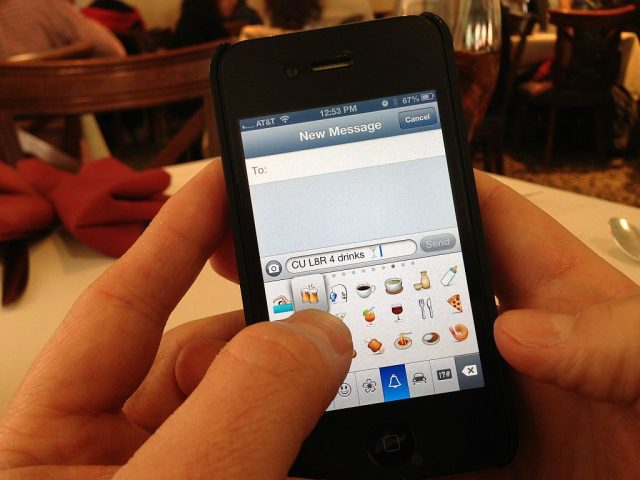
AT&T, Verizon, and other wireless carriers are urging the Federal Communications Commission to reject a petition that would impose common carrier regulations on text messaging.
The FCC this year reclassified both fixed and mobile Internet access as common carrier services under Title II of the Communications Act and used the new classification to impose net neutrality rules that prevent Internet providers from blocking or throttling traffic. Wireless carriers already faced Title II common carrier regulation of mobile voice, but the status of text messaging has remained unsettled, along with the question of whether carriers can block text messages.
In August, the FCC was asked by Twilio to declare that text message service must face Title II regulation, raising concerns among mobile carriers. AT&T and Verizon urged the FCC to reject Twilio's petition, and so did CTIA—The Wireless Association, which represents carriers in general. CTIA wrote in a filing on Friday that new restrictions could prevent wireless operators from blocking spam.
"Twilio frames its Petition as an effort to curb what it calls the 'blocking' and 'throttling' of messaging traffic but in fact, Twilio is asking the Commission to invalidate consumer-protection measures that prevent massive quantities of unlawful and unwanted mobile messaging spam from reaching and harming consumers," CTIA wrote.
AT&T and Verizon made similar arguments in their own filings Friday. Sprint and T-Mobile did not write in themselves, but are represented by the CTIA.
Twilio: Carriers blocked messages to boost revenue
Twilio, which makes software that application developers can use to automatically send text messages, argued that text messaging should already be treated as a Title II service because it falls under the Telephone Consumer Protection Act (TCPA) telemarketing law. But carriers are "treat[ing] messaging services as if they are in a regulatory no-man's land," Twilio wrote.
Twilio said messages sent by its customers were recently blocked by wireless carriers.
"Twilio provides an integrated service that allows businesses to send and receive text messages from the same toll-free number that they publish to field voice calls from consumers," the company said.
This gave customer service agents another way to field questions from customers. "Then one day Twilio's customers just stopped receiving text messages from their customers for no apparent reason," the filing continued. "When Twilio asked the wireless carriers what was happening, they informed Twilio that they decided to route this traditionally 'called-party-pays' traffic to an alternative messaging aggregator (presumably under revenue-sharing agreements). This other aggregator then demanded that Twilio enter into a contract requiring Twilio to pay for this toll-free traffic that the wireless carriers' customers were sending (or, more accurately, trying to send) to Twilio's customers before turning the spigot back on, despite prior Commission precedent prohibiting blocking in the context of intercarrier compensation disputes."
The FCC's net neutrality order released in March said that carriers cannot block messages delivered over the Internet but did not clarify the status of traditional text messages. The FCC already had opened a proceeding on the issue before Twilio's petition, but the company's request spurred a new round of filings from carriers, companies that rely on text messaging, and advocacy groups.
Twilio's petition was supported in a filing on Friday by consumer advocacy groups Public Knowledge, Common Cause, and Free Press. These groups addressed the question of whether text messaging should be defined as "telecommunications" for purposes of Title II common carrier regulation.
A text message is already considered equivalent to a telephone call under the TCPA, which itself is codified in Title II, the filing said. It is thus "logical for text messages to be afforded the same regulatory status as voice calls in other respects, as well," the groups wrote. Since wireless carriers bundle voice calls, messaging, and data, "it would be anomalous and contradictory if voice and data, but not text messaging, were considered telecommunications."
Public Knowledge and other groups petitioned the FCC on this very issue in 2007, saying that carriers were blocking messages from activist groups and competing communications providers.
"The carriers’ behavior in exercising subjective judgment over users’ text message content persists to this day," Public Knowledge et al said in their most recent filing. "Carriers continue to utilize text message blocking to drive companies and consumers toward the revenue-generating short code system, leveraging their total control over access to end users to drive up prices and stifle innovation."
The consumer advocacy groups pointed out that several small businesses complained about carrier behavior in other filings to the FCC. "ShowingTime, a startup helping realtors manage multiple showings, wrote to share its experience that 'this year, carriers have begun blocking more and more text message traffic, almost entirely due to volumes being sent, or the [similarity of messages] despite the fact that 'ShowingTime sends no marketing or unsolicited text messages,'" the groups wrote. "ClearCare, a [San Francisco] company that helps in-home healthcare providers communicate with their caregivers, shared its concern that uncertainty and an inability to rely on delivery of text messages raises concerns that patients 'could miss critical care that they need.'" (All filings can be found here.)
AT&T: Texting is immune to common carrier regulations
AT&T argued that mobile messaging is “statutorily immune” from common carrier regulation, in part because it doesn't allow communication with everyone on the public switched telephone network (i.e., the traditional landline system).
Verizon also argued that text messaging should be treated as a lightly regulated "information service," similar to e-mail. Verizon said that mobile messaging has remained relatively nuisance-free compared to the problems of e-mail spam and robocalling.
"Wireless providers like Verizon have worked hard to protect their subscribers from spam and robotexting, and have succeeded," Verizon wrote. "Twilio provides no basis to upend that successful system—in which Twilio itself is flourishing—to advance its own, narrow interests or to impose common carrier regulation on one small part of the messaging space."
reader comments
86